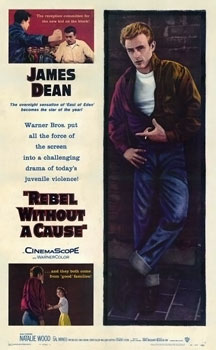
This is another famous classic that we had yet to watch and naturally we were reminded of its existence by La La Land. It’s another case in which many of the individual elements are familiar, such as James Dean’s iconic look, the knife duel and the car chickie run, yet have never added up to a coherent whole. As it turned out, this is indeed an eminently watchable film but I’m not certain that it would have become the huge cultural icon that it is if Dean had not died one month before its release.
Jim Stark is arrested one evening for public drunkenness and brought to the juvenile division of the police station where he meets two other teenagers, Judy and Plato. It turns out that Jim’s family often moves around and that all three have problems with their parents. At school, Jim butts heads with the leader of the local gang Buzz who goads him into a knife fight when they are on a field trip to the famous Griffith Observatory. Plato latches on to Jim as a cool father figure while this goes on while Judy, as Buzz’s girlfriend, watches on with amusement. After Buzz discovers that Jim is sensitive to being called chicken, he challenges Jim that evening to race two cars to the edge of a cliff to see who has the courage to stay in their car the longest before bailing out. Jim jumps out at the last minute but Buzz’s jacket entangles him and he plummets to his death.
I know that watching this through modern eyes isn’t quite fair but I had to struggle against being constantly irritated by it. Its themes are of course groundbreaking and fairly profound for its time: the generational gap and the inability of parents to communicate with their children; about the youths of that era struggling to find meaning amidst the post-war prosperity of the 1950s; perhaps even a hint of a lack of any central moral authority. However a modern audience won’t be able to help but notice that these kids seem to have an extraordinarily privileged upbringing. They have cars, good schools, large houses, cool clothes and so on. I was gobsmacked that their police station not only has a properly outfitted juvenile division but they were even staffed by detectives who were willing to make the time to listen to their family problems. Completely unheard of! This sort of lays bare to me that they are all rich brats and their angst stems from rich world problems. It makes it rather difficult to view them in a sympathetic light.
Another thing is that for all that this film is seen as a teenage manifesto for rebellion, it’s social mores are conservative to a rather startling degree. At its heart, it’s an affirmation that the traditional nuclear family, with a male patriarch at the head of the household and the wife being subservient no less, is essential for children to be brought up properly. Each of the characters is damaged due to some failing or other of their family with Plato being literally insane because he has never known a father and his mother is constantly absent. As such this film isn’t championing youth so much as admonishing adults for not being proper guardians and mentors, forcing them to seek meaning on their own or step into leadership positions before they’re ready to do so. Seen in that light, the moral panic that this film inspired back when it was released seems really funny. It’s actually very careful not to be offensive. For example, Jim is arrested for drunkenness, but I don’t believe we actually see him or any other characters drink alcohol. In the one scene in which drinking is prominent, he drinks milk which carries all the usual symbolism.
Overall Rebel Without a Cause is entertaining enough as a film about teenage angst, albeit with actors who are all clearly too old for their roles, but I found it tough to take its themes at face value. Even how it is remembered as a cultural icon today seems very much at odds with what the film was trying to say back in the day. I’m very glad to have watched but I wouldn’t call it a great film and indeed its director Nicholas Ray doesn’t seem to have made a name for anything else.